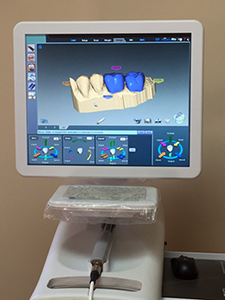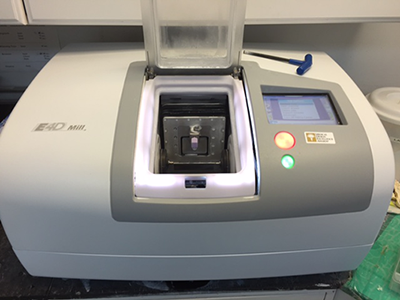Our Services
Initial Oral Examination
Your first visit at our office is very important in establishing your oral health baseline. We will perform a complete oral examination which includes an oral cancer screening, periodontal evaluation, an analysis of your occlusion (bite) and a thorough examination of your teeth, their supporting structures and of the oral anatomy.
Radiography
Using the most advanced dental technology possible is just as important as staying up-to-date on the latest treatment techniques. Because our practice is dedicated to providing you with the safest and most convenient treatment options available, we utilize advanced digital X-ray technology in our office. Digital X-rays provide several advanced imaging options designed to save time, provide clearer dental photos, and expose patients to 90% less radiation than with traditional X-ray technology.
The Preventive Program
Both natural teeth and teeth with restorations survive best in an oral environment that is clean and where the intake of harmful foods is controlled. Our dental hygiene program is designed to help prevent new cavities, preserve teeth that have been restored and manage periodontal disease. We recommend that each patient be seen at least twice a year for a dental prophylaxis.
Composite (Tooth-Colored) Fillings
Newer dental fillings include ceramic and plastic compounds that mimic the appearance of natural teeth. These compounds, often called composite resins, are usually used on the front teeth where a natural appearance is important, but they can also be used on the back teeth depending on the location and extent of the tooth decay.
Root Canal Treatment
Root canal therapy is needed when the nerve of a tooth is affected by decay or infection. This simple treatment can save your natural teeth and prevent the need of dental implants or bridges. Symptoms of the infection are generally acute dental pain or sensitivity to hot, cold or percussion. If you experience any of these symptoms, your dentist will most likely recommend root canal therapy to eliminate the diseased pulp. This injured pulp is removed and the root canal system is thoroughly cleaned and sealed. This therapy usually involves local anesthesia and may be completed in one or more visits depending on the treatment required. Success for this type of treatment occurs in about 90% of cases.
Crowns & Caps
The terms dental crowns and caps are synonymous. Crowns are typically used to restore a tooth's function and appearance following a restorative procedure such as a root canal. When decay in a tooth has become so advanced that large portions of the tooth must be removed, crowns are often used to restore the tooth. Crowns are also used to attach bridges, cover implants, prevent a cracked tooth from becoming worse, or an existing filling is in jeopardy of becoming loose or dislocated. Crowns also serve an aesthetic use, and are applied when a discolored or stained tooth needs to be restored to its natural appearance. Crowns are fabricated in a laboratory and are made either of porcelain baked onto a metal substrate, all-porcelain, or many of the new ceramic materials that have been developed.
Same Day Crowns
Using advanced, breakthrough technology (E4D TEchnologies) and practice methods, we are able to give you state-of-the-art dental crowns in just one day. Our staff are highly trained in the most up to date proceedures for dental care. If you are in need of a dental crown, then this alternative is a must to consider.


Bridges and Dentures
A bridge may be used to replace missing teeth, help maintain the shape of your face, and alleviate stress on your bite. A bridge replaces missing teeth with artificial teeth, looks great, and literally bridges the gap where one or more teeth may have been. Your bridge can be made from gold, alloys, porcelain, or a combination of these materials and is bonded onto surrounding teeth for support. There are two basic types of bridges. A fixed bridge is a cemented bridge which remains in your mouth at all times and is supported by your natural teeth. Removable bridges (partials and full dentures) are removed from the mouth several times a day for cleaning and rest on the gum where the missing teeth are being replaced.
Implants
If a tooth is extracted or missing for some other reason, it is now possible to replace it using dental implants. An implant is a new tooth made of metal and porcelain that looks just like your natural tooth. It's composed of two main parts: One part is the titanium implant body that takes the place of the missing root, and the second part is the tooth-colored crown that is cemented on top of the implant. In addition to tooth replacement, implants may be used to anchor dentures, especially lower dentures that tend to shift when you talk or chew. For patients with removable partial dentures, implants can replace missing teeth so that you have a more natural-looking smile.
Veneers
Gaps, chips, stains, or misshapen teeth can now be treated with wonderful results and very conservatively using porcelain veneers. Veneers are natural in appearance, and are a perfect alternative for patients wanting to make minor adjustments to the look and feel of their smile. Veneers are thin, custom-made shells made from tooth-colored materials (such as porcelain) designed to cover the front side of your teeth.
Tooth Whitening
Our in-office state-of-the-art bleaching system will make your teeth whiter and brighter. You can also choose our easy at-home applications with outstanding results achieved in just days.
Extractions
When tooth removal is necessary, we can perform simple and surgical extractions using nitrous oxide and or oral sedation. If you choose, we can also replace the missing teeth with dental implants.
Periodontal Treatment
Periodontal treatment methods depend upon the type and severity of the disease. We will evaluate the extent of your periodontal disease and recommend the appropriate treatment. Periodontal disease progresses as the sulcus (pocket or space) between the tooth and gums gets filled with bacteria, plaque and tartar, causing irritation to the surrounding tissues. When these irritants remain in the pocket space, they can cause damage to the gums and eventually, the bone that supports the teeth. If the disease is caught in the early stages of gingivitis, and no damage has been done, one to two regular cleanings will be recommended. You will also be given instructions on improving your daily oral hygiene habits and having regular dental cleanings. If the disease has progressed to more advanced stages, a special periodontal cleaning called scaling and root planing (deep cleaning) will be recommended. If the pockets do not heal after scaling and root planing, periodontal surgery may be needed to reduce pocket depths, making teeth easier to clean.
Pediatric Dental Care
We take pride in creating and maintaining beautiful and healthy smiles for our younger patients in an environment that is lighthearted and fun. We focus on establishing oral health habits that last a lifetime, with education and prevention as our primary tools.
Invisalign
Consider Invisalign to get the beautiful straight teeth you've always wanted - without braces. Dr. Esposito is a certified Invisalign provider and will be happy to discuss whether Invisalign would be an appropriate treatment for you. He has also lectured on this topic and have produced great results that thrill his patients.
Invisalign uses a series of invisible, removable, and comfortable aligners that no one can tell you're wearing. These retainers are worn 23 hours a day and are changed every two weeks. Invisalign is made with 3-D computer imaging technology and has been proven effective in treating many orthodontic cases that previously required braces.



